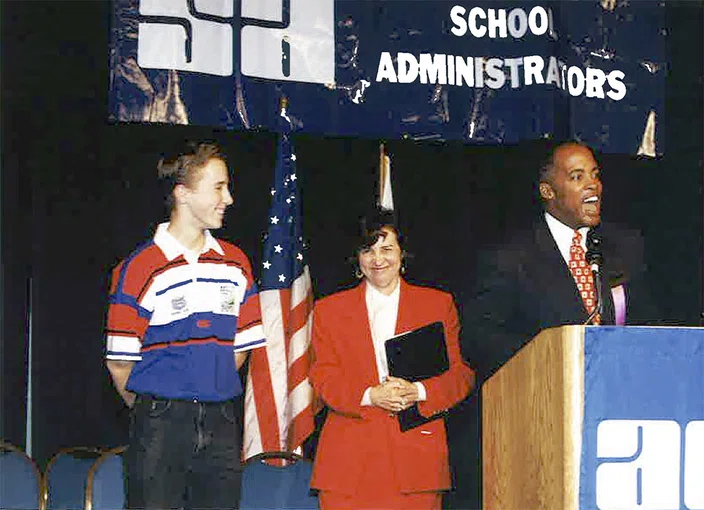
ACSA President Sidney Morrison, at right, during ACSA’s annual conference in 1997.
ACSA celebrates 50 years of supporting members
January 31, 2022
Editor’s note: This is the second of three articles looking back at ACSA’s accomplishments over the last 50 years.
- Oct. 4: A Driving Force for Education
- Jan. 31: Developing and Supporting Leaders
- March 14: Advocating for Every Student
One of the goals expressed in ACSA’s mission statement is “the development and support of inspired educational leaders.” For the last 50 years, ACSA has made that goal a reality through the guidance and work of ACSA members and staff who have stayed attuned to the changing needs of educators.
ACSA remains the preeminent source of professional development for school administrators in California. The association has also given tremendous support to its members, providing legal advice, communications tools, recognition programs and vital information they need to fulfill their important role in schools.
Top-notch PD
Previously known as the Professional Services Department, ACSA’s Educational Services Department has grown from staging one Annual Conference each year to putting on dozens of conferences, academies, credentialing programs and workshops that give members the opportunity to build their capacity to lead.
ACSA’s first annual conference was held in Anaheim. Since then, ACSA’s professional development conferences have expanded to include a multitude of offerings, many tailored to the needs of specific roles in school leadership. These conferences have proved a vital place for school leaders to gather, share knowledge and experience fellowship. Over the years, attendees have heard keynotes from countless luminaries in the world of education, but also from such notable names as Rev. Jesse Jackson, actor Marlee Matlin, Henry Winkler (a.k.a. Fonzie from “Happy Days”) and author Mitch Albom (“Tuesdays with Morrie”).
ACSA’s professional development often bridges the gap between what school administrators learn in their administrative credential programs and the “on the ground” knowledge they need to perform and grow as leaders. One of the ways ACSA does this is through the ACSA Academy Program.
ACSA’s first Academy, the Personnel Administrators Academy, was developed in the mid-1980s under the vision and leadership of ACSA Assistant Executive Director Ray Curry and key state personnel leaders including, Bob Kahle, assistant superintendent Asuza USD; George Perazzo, professor, California State University System; Eli Vukovich, assistant superintendent in Anaheim City Schools; and the state ACSA Personnel Committee. They recognized the need for a more comprehensive training program for administrators, classified educational leaders and managers new to Personnel.
Subsequently, academies have been developed in more than 10 additional leadership specializations. Literally thousands of school administrators have participated in the ACSA Academy Program over the years.
“The Academies have always been about helping administrators grow, improve, and prepare for new assignments,” said Maureen Burness, who was a director of the Special Education Academy from 1996 to 2020. “And Special Education has been an area where administrators truly need expertise. Every year, at the beginning of our sessions, I emphasized how critical the work of a person responsible for Special Education in a district is, but emphasized even more that how we do that work, with compassion and support for the students as well as parents and the staff, with strong relationships being needed to do that, was at least as or even more important.”
ACSA has also had a tremendous impact on helping new administrators clear their administrative services credential. In 2004, ACSA was approved to offer a Clear Administrative Services credential program in partnership with the University of California Santa Cruz’s New Teacher Center. When the CASC program standards were revised in 2010 to require a job-embedded induction experience, ACSA’s program became a standards-based program and soon thereafter, ACSA the sole sponsor. The program serves around 500 candidates each year through 21 local programs that match ACSA-certified Leadership Coaches to support the candidates over the course of this two-year program.
Just 25 years ago, ACSA was offering professional development sessions to help educators integrate the internet into classrooms. Today, ACSA’s professional development itself is held online. In 2020, ACSA launched its Online Learning Center, a one-stop website for webinars, on-demand courses and microlearning topics to support educators’ knowledge areas. During the COVID-19 pandemic, Academies, workshops and conferences became virtual experiences, where attendees could log on from their computers to access online conference rooms.
Finding your village
When ACSA was founded in 1971, there was no single department charged with increasing membership in ACSA.
That changed in 1998 when the Member Services Department was founded by Joe Jones.
Margie Cuizon-Armelino, who was working in the Educational Services Department at the time, remembers Jones tapping her on the shoulder.
“He said meet me in the parking lot. There’s something I want to talk to you about,” she recalled.
Jones wanted to recruit her for a new division at ACSA, which would increase membership numbers and thus support the financial solvency of the association.
“We had communications, finance, legal and professional development, but none of those departments were focused on growing and developing membership,” Cuizon-Armelino said. “So there was a thought that maybe we ought to be paying attention to this.”
Under Jones’ leadership, Cuizon-Armelino was charged with putting the new department on the map, which she did through many avenues, including the Membership Matters column in EdCal. Membership started to grow from 14,500 in 1997 to more than 16,700 in 2008.
There were four Professional Standards Advocates when Member Services launched, and they were struggling to handle increased caseloads. Jones proposed adding more advocates and the group was renamed the Member Assistance & Legal Support Team, known as MALST for short.
One of those new hires was Lloyd Wamhof, a former ACSA board member who had just retired as superintendent of Kerman USD.
Wamhof said working on MALST can be very personal in nature, as members call for support through various difficult situations, such as contract negotiations, dismissals, ethical concerns and grievances. The team has supported more than 16,000 individual members over the past 20-plus years and has reached many others through presentations at ACSA’s professional development events.
“Assisting our members is what brings me the most joy in doing this work. I have the privilege of continuing to work with such dedicated administrators in California,” Wamhof said. “I would only hope to have at least offered our members some degree of peace of mind and support, however, I will leave that judgment to them.”
The department is also staffed with Member Recruiters, who are in charge of selling memberships, and Member Services Ambassadors, who are the friendly faces welcoming new members to the world of ACSA. The department also organizes networking groups and a Mentor Program that has paired close to 700 veteran administrators with new admins (or those new to their role). These are just some of the “value added” benefits of being an ACSA member.
“This is where you find your people, find your village,” Cuizon-Armelino said. “It’s where we get you and we got you.”
Spreading the word
When Lew Armistead was hired as ACSA’s first Public Information executive in 1976, he was in charge of organizing a department that today is known as the Marketing and Communications Department.
According to a 25th anniversary publication, Armistead traveled up and down the state, training ACSA members in public relations skills. ACSA also staged professional development events aimed at helping districts better communicate through school newsletters — after all, there was no internet or e-mail back in those days.
The department was also in charge of producing its own publications to get important information into the hands of administrators: THRUST (which is now known as Leadership magazine) was a scholarly magazine and EdCal was the only education weekly newspaper in California.
EdCal was and remains important for job-seeking administrators. At the back of EdCal was a section called JiS (Job Information Service), which today is known as CareerConnect. Members would read EdCal “from the back,” if they were looking to move up in their careers. In 2014, boxed job ads were replaced with classified-style job listing and in 2018, the online Career Center was launched, both of which remain robust today.
With changing modes of communication over the last few decades, ACSA has continued to reach members in relevant ways. In 2009, ACSA joined Twitter and Facebook and has grown its audience on each platform to more than 11,000 followers and 8,000 followers respectively. In 2018, ACSA launched its Resource Hub, an online library of up-to-date resources to support the success of school administrators.
At the start of the COVID-19 pandemic in 2020, Marketing and Communications launched online news shows like ACSA’s Legislative Lunch Break to deliver up-to-the-moment information to members coping with constantly changing public health guidance.
Marketing & Communications also coordinates ACSA’s annual awards programs: Every Student Succeeding, Administrator of the Year and Special Awards. Hundreds of nominations are received at the state-level each year. (You can find a searchable list of previous winners at www.acsa.org/awards.)
Former ACSA President Bob Lee (2007-08) has served on the Awards Committee twice and said it has allowed him to witness the incredible leaders we have throughout California.
“Our awards program is one of ACSA’s capstone programs,” he said. “Recognizing the work and dedication of leaders cannot be understated. Administrators are usually the last to self-recognize because it is our nature to recognize everyone else first.”
Further, Lee credits programs like awards and the “Leadership Matters” public relations campaign with restoring the public’s confidence in the essential role school administrators play in schools.
“The media and school boards support administrators being recognized and rewarded. Administrators throughout California have a sense of pride when one of their fellow administrators is recognized statewide,” he said. “There is no more administrator bashing, and talk of top-heavy school districts or overpaid administrators has been absent. ACSA should be proud of this heavy lift and what this recognition program has done for administrators.”
Former ACSA Assistant Executive Director for Communications Tom DeLapp presents during a 1989 workshop on school newsletters, which was one of the few ways schools could communicate in those days.
ACSA leaders do a ribbon cutting to open the 7th annual spring conference.
Awards are presented in 1991, the first year of the Administrators of the Year program.
The 2007 Leadership Summit Bookstore.
A hypnotist provided entertainment during a 1994 conference.
Former state Superintendent of Public Instruction Bill Honig at a conference in 1986.
ACSA once produced dozens of printed training manuals, VHS tapes and resources such as this one on classroom observations.
Contact Us
www.acsa.org
© 2022 Association of California School Administrators








